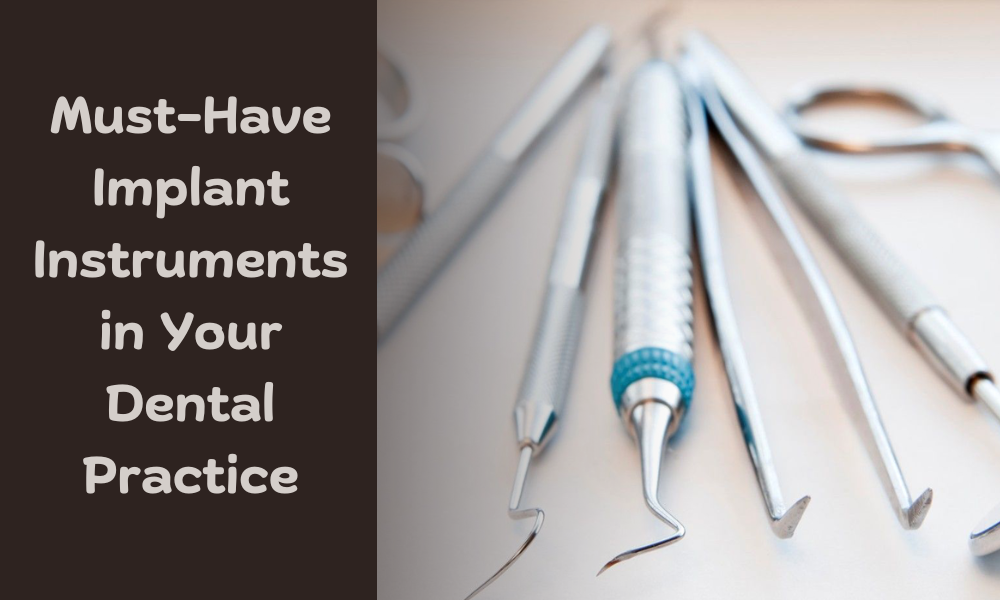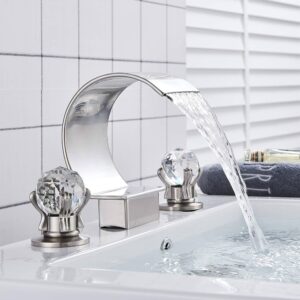Must-Have Implant Instruments in Your Dental Practice
5 min read
Lost teeth or missing tooth roots in the mouth make an individual feel self-conscious and fail to smile or interact with confidence. Additionally, tooth loss results in abnormalities that leave an impact on eating habits. Thus, affecting the overall health.
Here, the dental implant procedure comes as the savior. It is the greatest advancement in the dentistry field. Quality dental implant kits are widely available and used for tooth replacement. It comprises instruments like periodontal probes, curettes, bone grafting forceps, scalers, and more. Replacing the missing tooth roots with fixed teeth offers sufficient stability and resilience to chew food. Speech aesthetics and self-confidence improves. Furthermore, they help facilitate and maintain jaw bones. Therefore, enabling the surgeons to perform the procedures without any bone damage and helps support the contours and facial structure.
In this write-up, we will cover what dental implants are and what tools this procedure covers.
Overview of Dental Implants
Dental implants are screw-like structures or fixtures that surgeons insert into the jawbone. It acts as an anchor or support to the artificial tooth called the crown or entire denture inside the mouth. These crowns are made to fit the individual’s mouth and seem natural. Further, a tool known as an abutment is used to attach the artificial tooth to the dental implant.
Many patients do not find dentures or bridges comfortable. The reason can be poor ridges or sore spots in the mouth. Here, dental implants are capable of dealing with all such hassles. These are more natural, durable, and versatile, providing enough aesthetic appeal to surgeons. This procedure reduces teeth sensitivity, reduces the chances of cavity development, and improves food chewing.
List of Essential Dental Implant Surgery Instruments
Periodontal Probes
These are necessary dental implant tools to identify and treat periodontal issues. Assessing the distance between abutments and implants is one specific problem that periodontal probes help to measure. It also assists to confirm the depth of the tissue.
Dental Elevators
Dental elevators are instruments useful in implant placement and other dental surgical procedures. They aid in performing multiple dental activities like gingival reflection and movement of the teeth, among others. Before pulling teeth out of the socket, they are additionally used to loosen teeth.
It has comfortable handles that provide sufficient grip when performing the procedure. Thanks to a robust handle design, more force with less pressure are being exerted on the hands. Dental elevators assure durability as it is made from good quality stainless steel. Dental surgeons can loosen the periodontal ligaments with safety and make the tooth ready for extraction purposes.
Scalers and Curettes
Curettes are a must in every dentistry practice. These are used to remove the calculus or plaque deposit from the teeth surface. It removes the plaque in both ways: Subgingivally and Supragingivally. Even the role of scalers is similar to the curettes. However, these remove only the moderate tartar buildup beneath the gingival margin.
Talking about curettes, these are available in multiple types. Each of these is attractive and simple to use. Consequently, the dental surgeon doing the treatment will have a positive experience. In addition, both scales and curettes are durable, efficient, and strong.
Periotomes
In dental procedures, periotomes are used to cut the periodontal ligaments. The periotomes are used by dental surgeons, particularly for dental implantations. It has razor-sharp, narrow blades. As a result, there will be little to no harm done to the ligaments or other bones. These blades have angular and straight forms. Which one to pick, however, will depend on the procedure to be done as well as the needs of the doctors.
Extracting Forceps
Dental extraction forceps are used during surgical procedures to grab and remove the teeth. These forceps are available in straight and curved beaks. The curved ones are used to make it simple to reach treatment-required hard-to-reach places. It aids surgeons in capturing the soft tissues and blood vessels of the mouth, which block the effectiveness of surgical procedures.
Besides all this, forceps make it possible to remove the tissue, apply the necessary force to an area that needs to be dissected, and assist with manipulating sutures.
Dental Rongeurs
Dental rongeurs are robust instruments. Large portions of bone are cut and trimmed using them by experienced surgeons. When an implant or recontouring is required, that is when it is best used. The rongeurs are small, hand-held instruments with thick, short beaks. It makes it simpler and more effective to cut away the tooth bones. Additionally, its scoop-shaped points and plier-like form make bone gouging simple.
Dental Retracting Instruments
Dentistry professionals have access to retracting instruments that fall under the category of implant instruments. The tools have little paddle ends that assist in separating and retracting the tooth from underlying bones. Furthermore, the big paddles come into use when there is the requirement of pulling the flaps without causing any tissue tears.
Surgical Scissors
The surgical scissors are also an essential instrument of dental implant kits for the execution of surgical procedures. Its razor-sharp blades are made from robust and good-quality stainless steel to ensure surgery precision and safety. Also, the tool will be available for long-term use.
Bone Packers
This surgical equipment is made from good quality stainless steel. They are typically used in dental offices to compress the patients’ mouth bones. Bone-packers are tools with two working ends that can be detached. The outer body of the tool is serrated to provide a secure grasp on the tool.
Conclusion
To conclude, dental implants are the bone-attached components that aid in tooth replacement. A surgery like this has a high success rate and offers long-term advantages. There are frequent situations where several individuals need additional procedures to prepare their mouths for dental implants. However, everything is possible if you have all the essential tools in your practice and this is why the list is shared above with you.
In addition, there are several other surgical instruments like tissue punches, needle holders, burs, drills, surgical implement kits, luxating elevators, hemostats, scalpels, etc. All of these help to ease the implant placement procedure. Ensure you get the supplies from reputable manufacturers so you can deliver the best possible experience and treatment to the patients.
Thanks for Reading!!





